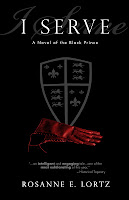By Rosanne E. Lortz
“…we few, we happy few, we band of brothers.”
Before the war began in 1337, French—not English—was the language of literature and the language of the aristocracy in England. It does not take much digging around to unearth why. The Norman Conquest in 1066 established a monarchy and a ruling class who spoke French, and the later Plantagenet kings—Richard the Lionheart comes to mind—continued to spend as much (or more) time in their continental holdings as they did in England.
English, the language of the conquered Anglo-Saxons, existed of course, but only for menial, non-important purposes. Historian Elizabeth Hallam writes that:
Although in 14th century England everyone spoke some form of English, French was still the language of polite society, and used for less formal governmental business which was not transacted in Latin. The country gentry and middle class continued to use French for normal correspondence: there are almost no extant English letters before 1400. Proclamations in London were still made in French, which was also the language of the law….So what changed? How did the language of English gain ascendancy over French? Hallam hypothesizes that, “the transformation was almost certainly a result of the surge of patriotism and nationalism associated with the Hundred Years’ War: the French language came to be associated with the enemy.”
During the same time period that the battles of Crecy and Poitiers were fought, schools began to use English in the classroom as a medium with which to teach Latin. And in 1363, a couple years after the treaty of Bretigny, “parliament was opened by a declaration of the summons in the native tongue,” something that had previously always been done in French. According to the philologist Oliver Farrar Emerson, “Soon English petitions to parliament, English wills, letters, and gild statutes appear.”
Because of the war with France, the language of English began to be used by all levels of English society for all manner of purposes. Books were the last hold out. But by the last quarter of the century, Geoffrey Chaucer showed that the vernacular could be a fitting vehicle for great literature, and English began to be used in that arena as well.
The change in language effected by the Hundred Years' War was radical. At the beginning of the fourteenth century, French was the accepted language of all formal discourse in England. By the end of the fourteenth century, Oxford University was forced to urge the learning of French “lest the Gallic tongue be utterly forgotten.”
Which leads us back to one of those interesting what-if’s in history: if not for the Hundred Years’ War and the animosity it created between French and English, would the Bard’s St. Crispin’s Day speech have been written entirely in French?
“…nous frères d’armes.”
______________________
Rosanne E. Lortz is the author of I Serve: A Novel of the Black Prince, a historical adventure/romance set during the Hundred Years' War, and Road from the West: Book I of the Chronicles of Tancred, the beginning of a trilogy which takes place during the First Crusade.
You can learn more about Rosanne's books at her Author Website where she also blogs about writing, mothering, and things historical.
______________________
BIBLIOGRAPHY
Emerson, Oliver Farrar. “English or French in the Time of Edward III.” Romanic Review 7.2 (April-June 1916): 127-143.
Hallam, Elizabeth, ed. Chronicles of the Age of Chivalry. London: Salamander Books Ltd., 2002.


I love reading with my kindle HD and all the free and discounted books.
ReplyDelete